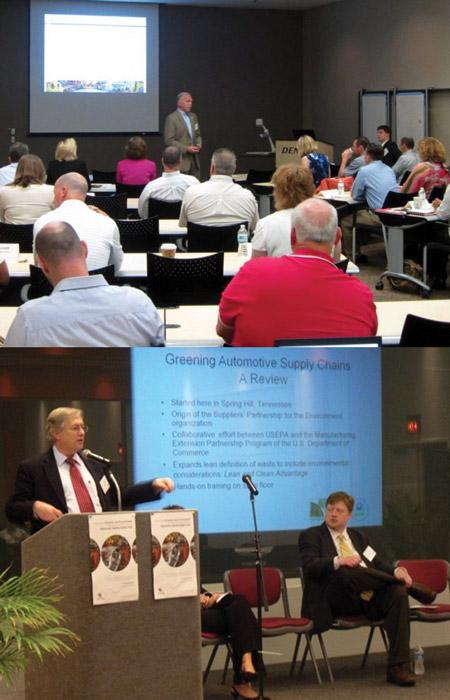- FMA
- The Fabricator
- FABTECH
- Canadian Metalworking
Categories
- Additive Manufacturing
- Aluminum Welding
- Arc Welding
- Assembly and Joining
- Automation and Robotics
- Bending and Forming
- Consumables
- Cutting and Weld Prep
- Electric Vehicles
- En Español
- Finishing
- Hydroforming
- Laser Cutting
- Laser Welding
- Machining
- Manufacturing Software
- Materials Handling
- Metals/Materials
- Oxyfuel Cutting
- Plasma Cutting
- Power Tools
- Punching and Other Holemaking
- Roll Forming
- Safety
- Sawing
- Shearing
- Shop Management
- Testing and Measuring
- Tube and Pipe Fabrication
- Tube and Pipe Production
- Waterjet Cutting
Industry Directory
Webcasts
Podcasts
FAB 40
Advertise
Subscribe
Account Login
Search
Auto Suppliers Partnership for the Environment builds strong companies 5 ways
- December 15, 2016
- Article
- Shop Management
Considering the competitive state of the automotive industry, any kind of best practices sharing and collaboration among automotive OEMs would seem counter-intuitive. Yet, on the important topic of the environment, major automakers and top suppliers have been doing just that since they formed the Suppliers Partnership for the Environment (S/P).
The partnership brings automakers, their suppliers, and the U.S. Environmental Protection Agency (EPA) together “to improve environmental performance while providing economic value to the automotive supply chain.”
Members include such heavyweights as OEMs GM, Ford, FCA, Toyota, Audi Mexico, and Lear Corp., as well as tier stamping and component suppliers BAE Industries, Flex-N-Gate, Metalsa, DENSO, and Nemak. Organizations providing environmental support include Covanta, Abednego Environmental Services, Waste Management, and, as mentioned, the U.S. EPA.
The partnership meets quarterly, with members taking turns hosting and presentations on five focus topics: energy, materials efficiency, waste management, green chemistry, and water quality and use reduction, as well as emerging global and local sustainability issues, supply chain dynamics, and opportunities.
Automakers’ Sustainability Achievements
It may surprise those outside the auto industry just how green the auto segment has become. S/P members lead many other segments in achieving zero-waste-to-landfill status; sourcing renewable energy and cutting energy consumption and carbon emissions; sourcing renewable and recycled content in the manufacture of their components; using green chemicals such as cleaners, lubricants, and rust preventives; and reducing water use.
For example, GM has achieved zero landfill in 139 sites around the world. Toyota has cut in half the energy consumed to produce a vehicle. Ford recently won the Society of Plastic Engineers’ (SPE®) Automotive Innovation Award for its seat fabrics made from 100 percent recycled materials. Ford’s use of REPREVE materials helps to divert more than 11 million water bottles from landfills annually, according to the automaker.
No doubt, being tasked with reducing fuel consumption via increased vehicular fuel efficiency to achieve corporate average fuel economy (CAFE) standards has influenced the member manufacturers to become immersed in environmental vigilance. CAFE, enacted by Congress in 1975, has set goals of 54.5 MPG by 2025 pursuant to what many scientists and environmentalists consider to be a universally critical goal today—reducing carbon emissions.
“Our science-based climate change strategy is based on doing our part to stabilize the atmospheric concentration of carbon dioxide (CO2) at 450 parts per million (PPM). This is the level that many scientists, businesses, and governmental agencies believe may avoid the most serious effects of climate change,” Ford states on its site.
The partnership will meet next on Jan. 19 at the GM RenCen in Detroit. New companies that supply goods or services to an automotive manufacturer or parts supplier are invited to join “in our mission to improve the environmental sustainability of the auto supply chain.” Details are available on the organization’s website, www.supplierspartnership.org.

DENSO Manufacturing Tennessee hosted the Suppliers Partnership for the Environment’s third-quarter meeting. DENSO’s Bob Booker discussed the plant’s sustainability activities (top). Tom Murray, former senior science adviser for the U.S. EPA, helped found the organization (bottom). Photos courtesy of the Suppliers Partnership for the Environment and DENSO.
subscribe now

The Fabricator is North America's leading magazine for the metal forming and fabricating industry. The magazine delivers the news, technical articles, and case histories that enable fabricators to do their jobs more efficiently. The Fabricator has served the industry since 1970.
start your free subscription- Stay connected from anywhere

Easily access valuable industry resources now with full access to the digital edition of The Fabricator.

Easily access valuable industry resources now with full access to the digital edition of The Welder.

Easily access valuable industry resources now with full access to the digital edition of The Tube and Pipe Journal.
- Podcasting
- Podcast:
- The Fabricator Podcast
- Published:
- 04/16/2024
- Running Time:
- 63:29
In this episode of The Fabricator Podcast, Caleb Chamberlain, co-founder and CEO of OSH Cut, discusses his company’s...
- Industry Events
16th Annual Safety Conference
- April 30 - May 1, 2024
- Elgin,
Pipe and Tube Conference
- May 21 - 22, 2024
- Omaha, NE
World-Class Roll Forming Workshop
- June 5 - 6, 2024
- Louisville, KY
Advanced Laser Application Workshop
- June 25 - 27, 2024
- Novi, MI
































